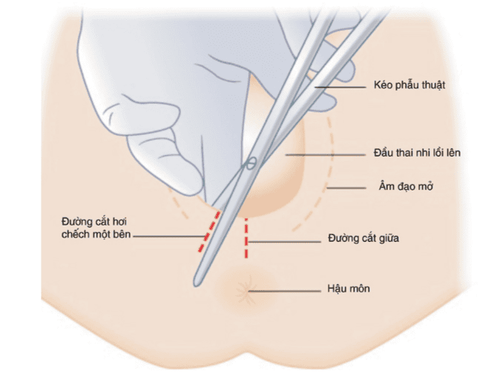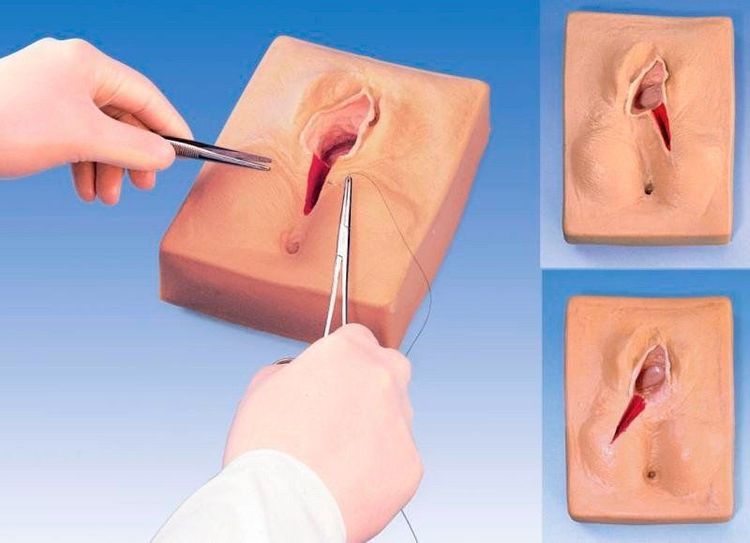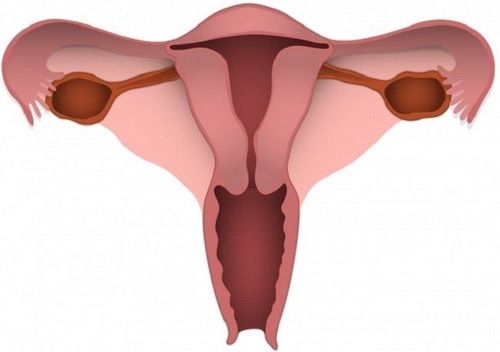This article is professionally consulted by Dr. Le Thi Phuong, Specialist I, Obstetrics and Gynecology Department, Vinmec Ha Long International General Hospital.
Women who give birth vaginally not only face the pain of labor but may also need an episiotomy to help deliver the baby. After this procedure, it might seem that the exhaustion and pain are over. However, many new mothers face the issue of their episiotomy stitches opening, requiring them to return to the hospital for treatment.
1. Why Is an Episiotomy Necessary?
The perineum in a woman's body, about 3-5 cm in length, is the shallow part of the pelvic floor, located between the anus and vagina. During childbirth, an episiotomy is often performed to assist and speed up the delivery process when the mother shows signs of difficult labor, such as a large baby, narrow pelvis, or wide biparietal diameter. Additionally, the procedure makes it easier for the use of assisted delivery tools such as forceps or a vacuum extractor.
An episiotomy is recommended in cases where there is a risk of tearing the anal sphincter, signs of fetal distress, preterm labor, or a large baby with a breech presentation. After the delivery, doctors will sew up the perineum. However, in many cases, the episiotomy stitches open or tear, leading to significant bleeding, which causes anxiety and confusion for mothers unsure of how to proceed.
2. Why Do Episiotomy Stitches Open or getting Tear?
Tears or openings in the episiotomy stitches (the area between the vagina and anus) are relatively common due to the pressure exerted by the baby's head trying to exit. Statistics show that up to 50% of women who have a vaginal delivery experience a small tear or opening in their perineal stitches after childbirth. The risk of tearing or opening is inherent in vaginal deliveries.
Tears in postpartum stitches are classified into four degrees: first-degree tear (involves only the skin); Second-degree tear (affects both the skin and the muscles of the vagina); Third-degree tear (extends to the area near the rectum and involves the vaginal tissues, skin, and perineal muscles); Fourth-degree tear (the most severe, involving the anal sphincter muscles - this type is rare).

Just like other wounds on the body, episiotomy stitches that open or tear take 7 to 10 days to heal, and mothers will experience pain for a few weeks.
3. Causes of Episiotomy Stitches Opening or Tearing
If the perineal stitches are properly cared for, and the mother maintains adequate rest, the risk of complications after birth is minimized. The wound will typically heal within 2 to 3 weeks, and normal sensation should return after about a month. Currently, to ease the process for postpartum mothers and avoid the need for stitch removal, doctors commonly use absorbable sutures for perineal repair.
However, not all vaginal births result in smooth healing of the episiotomy stitches. In many cases, the stitches may tear or open, and the causes include:
- Improper cleaning of the perineal area and lack of proper hygiene, hindering wound recovery.
- Weakened tissues in the perineum after suturing, making them more vulnerable to damage, leading to loose or broken stitches.
- Poor habits, such as sitting asymmetrically, improper posture when holding the baby, or excessive movement.
4. Signs That the Episiotomy Stitches Are Opening or Tearing
After the episiotomy stitches open or tear, mothers may notice some of the following signs:
- Pain and a burning sensation around the stitch area, especially during urination.
Infection of the stitches, with symptoms such as pus discharge, itching, or discomfort. - Excessive bleeding or the presence of blood clots.
- Fever or chills.
- Pain in the lower abdomen.
- Inability to control gas or bowel movements.
5. Is an Open Episiotomy Stitch a Serious Concern?

If an episiotomy stitch opens or tears and is not detected early, it can increase the risk of infection and significantly delay the recovery process. This can cause pain and leave permanent, unsightly scars. Therefore, when any abnormal signs are noticed, mothers should seek medical attention promptly for a thorough examination and timely treatment.
At Vinmec, highly trained and experienced obstetrics and gynecology doctors are capable of diagnosing and treating complex postpartum situations. Mothers with issues related to open episiotomy stitches will undergo a perineal examination, and doctors will determine the appropriate treatment based on each case.
To prevent the episiotomy stitches from opening, mothers should pay attention to their daily habits, movement, and hygiene. Keeping the perineal area dry, changing sanitary pads regularly, and avoiding infection are essential steps for successful recovery.
To arrange an appointment, please call HOTLINE or make your reservation directly HERE. You may also download the MyVinmec app to schedule appointments faster and manage your reservations more conveniently.














